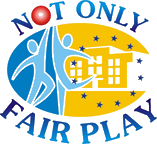
- Home
- Best
Practices - Toolkits
How to ... - Sport
Events - Guidelines
- Information
& Contacts - Project Management
A collection of student stories and initiatives about sport.
This section offers access to a collection of toolkits to promote sport at school.
-
 Physical Education Teachers
They are the main point of reference for students at school
Physical Education Teachers
They are the main point of reference for students at school
-
 Teachers
Teachers of all subjects can contribute to promote sport at school
Teachers
Teachers of all subjects can contribute to promote sport at school
-
 School Directors
Their support is a key element to promote sport at school
School Directors
Their support is a key element to promote sport at school
-
 Resources
A database of resources for teachers, PE teachers and school directors for the promotion of sport at school.
Resources
A database of resources for teachers, PE teachers and school directors for the promotion of sport at school.
Sporting events are organised in each partner country
Guidelines for policy makers willing to raise awareness on the importance of promoting sport in schools
Events
The Not Only Fair Play project has been promoted through conferences and articles.
Partnership
-
 Contractual Partners
From this section it is possible to access a description of each contractual partner of the Not Only Fair Play project.
Contractual Partners
From this section it is possible to access a description of each contractual partner of the Not Only Fair Play project.
-
 Schools
From this section it is possible to access information about the schools involved in the Not Only Fair Play Project in the 9 European countries involved.
Schools
From this section it is possible to access information about the schools involved in the Not Only Fair Play Project in the 9 European countries involved.
-
 Associated Partners
A number of associated partners officially joined the project in order to ensure the project sustainability by continuing to use the project deliverables over the next years.
Associated Partners
A number of associated partners officially joined the project in order to ensure the project sustainability by continuing to use the project deliverables over the next years.
This section of the Not Only Fair Play portal provides administrative information for the project contractual partners and for the European Commission, and is password protected.
 Context
Context Objectives
Objectives- The promotion of awareness of the importance of sport at school through a better integration of physical education into the school curricula.
- The enhancement of sport as a mean to promote social inclusion of all students
- The promotion of an ethical approach to Sport and physical activities
- The promotion of a comprehensive overlook to sports offer
 Target Groups
Target Groups- Schools
- School Directors
- Teachers
- Students
 Activities
ActivitiesCapitalizing of Success Stories and Best Practices
Collection of success stories and best practices in the promotion of sport and physical activities at school.The results of this activity are:
- Creation of a network of teachers and students in the 10 project countries
- Collection of case studies of school students who successfully managed to balance their school career with their passion for sport
- Collection of best practices project and initiatives for the promotion of awareness of importance of sport at school level
Creation of the Toolkits
Creation of guidelines for school directors, physical education teachers and teachers to exploit the use of sport at school.The results of this activity are:
- Guidelines for school directors
- How to promote the importance of sport at school
- How to integrate sport into curricular activities
- How to use sport as a mean of social inclusion
- How to support students to balance sport and study at school
- Guidelines for physical education teachers
- How to involve students in physical education activities
- How to use sport as a mean of social inclusion
- How to promote an ethical approach to sport
- How to promote less popular sports
- Guidelines for school teachers
- How to motivate students only interested in sport to improve their school performances
- How to integrate sport and healthy lifestyle approaches into the students’ educational pathways
- How to use sport as a mean to acquire transversal skills
Organisation of Sports Events
Planning, organization and management of pilot initiatives to promote the importance of sport at school.The results of this activity are:
- One sports event in each partner country
- Online exchange of experiences and opinions between target groups
Guidelines of Policy Makers
Cooperatively development of 2 guidelines for policy makers to raise awareness on the importance of promoting sport at school.The results of this activity are:
- Guideline on Sport and School Education focusing on:
- Promotion of sport at school level
- Integration between schools activities and sport activities
- Compatibility of sport activities and school success
- To promote all types of sports at school
- Guideline for policy maker on Education for an Ethic Based Sport focusing on:
- promotion of an ethical based approach to sport
- overcoming of the hypercompetitive approach to sport
- Importance of respecting rules (doping, match fixing, etc)
